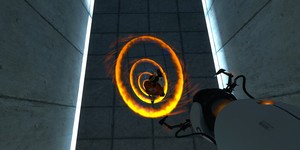
Portal Wench
So, how exactly does Portal feel to play? Well, as I’m sure you can imagine given the amount of time and effort being poured into the game, the whole product feels incredibly slick and well polished. That’s both in terms of the visual quality and the control system for the game.The controls themselves are obviously very familiar to anyone who has played any game on the Source Engine, be that Counter-strike: Source, Half-Life 2 or theTeam Fortress 2 Beta. I’ve always found it uncanny how each game engine seems to have it’s own look and feel and the Source Engine is no exception. As soon as you jump into the game you know exactly how the game will react to you, which is why the game doesn’t bother to introduce you to the basics of moving and looking around.
From the controls and feel of the game, right down to the font used in the loading screens, it straightaway feels like playing with an old-friend which, I suppose, isn’t too far from the truth.
The problem is that when you meet an old friend after a long time apart you end up remembering all the bad things as well as the good and, although the Source Engine is an excellent system which is constantly being improved on, it still suffers heavily from frequent load points. For some reason, those load screens seem to pop up more than ever and players can expect to have a minute's worth of pause every few rooms. That isn’t as bad as it seems though as the rooms often require a certain amount of thought and trial and error.
Crossing a room is never as simple as it first appears in fact, even with the portal gun. Although the portal gun itself is very easy to use, with the left and right mouse buttons firing different portals, the environment is never that easy to navigate. The levels are carefully constructed out of portal-proof materials in places and the game uses architecture very cleverly to stop players making portals in the wrong places.
Don’t go getting the idea that the game is that difficult though because it really isn’t. A lot of the earlier rooms can be completed and understood in just a matter of minutes at most, with later rooms proving manageable after you’ve picked up the basics.
Early Thoughts...
What we liked most about Portal was the way it has successfully carried over the sense of humour from projects like Narbacular Drop, a similar game made by the same team, to the Half-Life universe. On top of this, the excellent controls and familiar feel of the whole game help to make this physics-breaking phenomenon far more accessible than it really should be.That said, there are a handful of things which concern us. The first is replayability, which looks like it may be incredibly limited. After all, when you ignore the cool factor of the portal gun we’re essentially left with a simple, short puzzle game which some suspect may have been added on merely to bulk up the value-for-money appeal of The Orange Box.
The too-frequent loading screens are also a bit of a cause for worry and whether these are due to the pace at which we were progressing (the first rooms are deliberately, but ridiculously easy) or an actual limitation of the engine makes no difference. Of course, none of that really matters because the game still plays brilliantly and is a great example of how a simple, innovative idea can be incorporated into a game successfully without picking up lots of chaff and game clichés along the way.
Portal has one or two problems, but these are minor at worst and don’t really detract from the game experience. Easy to pick up, hilarious and deliciously streamlined, Portal could yet prove to be the best weapon in The Orange Box’s arsenal.

MSI MPG Velox 100R Chassis Review
October 14 2021 | 15:04











Want to comment? Please log in.